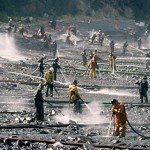A quarter-century ago today, I got a call in a Portland hotel room where I was working on a story about Oregon land use planning. I was told to go to Alaska instead.
The Exxon Valdez had run aground on Bligh Reef in Prince William Sound shortly after midnight and was leaking oil, big-time.
 I was the environmental reporter at the Seattle Times, and a couple Washington State smaller spills just prior to this Good Friday disaster had primed the paper’s interest. Managing editor Alex McLeod had commercially fished the Alaska area in his younger days, and that helped open the newsroom money tap as well.
I was the environmental reporter at the Seattle Times, and a couple Washington State smaller spills just prior to this Good Friday disaster had primed the paper’s interest. Managing editor Alex McLeod had commercially fished the Alaska area in his younger days, and that helped open the newsroom money tap as well.
The lack of air connections meant I didn’t arrive in Valdez until the day after the spill, and I still beat most reporters, Exxon officials, and lawyers to the site. The ship itself could only be reach by boat or plane. It was remote.
Smell is a big part of memory, and vivid for me was flying over the wreck with National Geographic photographer Natalie Fobes, a former Times colleague, and being overpowered by the stench rising off the slick when she opened a window to take pictures.
I spent the next six months on and off in Alaska. Living in a basement with no TV, I was astounded to learn how big the story had become the first time I returned to Seattle. Environmental stories were often more back-burner. This one was outrage.
Eventually our Times team would win a Pulitzer for coverage of what was mostly a cold, frustrating, dispiriting mess that left everyone exhausted and bitter.
If I was to pinpoint one cause for the accident, it would be the oil industry’s relaxation of its own safety protocols in the years after the Alaska oil pipeline opened. Folks became complacent, and Murphy’s Law had not been repealed. If something can go wrong, it will.
There was plenty of individual error and happenstance. A hard-drinking captain who left the bridge and went to bed when his ship was out of the normal lanes in dangerous waters. A third mate who ignored a lookout’s warning about being in the wrong place according to a buoy light – hey, she was a girl! Even a Coast Guardsman who left a monitoring radar to make coffee when the spill occurred, because of a shift change at midnight.
The oil industry was woefully unprepared for cleanup, and its early PR efforts were a disaster. I was among the writers and Alaskans who raised holy hell, and Exxon responded by dropping dollars on the spill in the form of a vast but somewhat futile cleanup effort that employed a lot of people.
The real root cause, which my newspaper emphasized that summer, was our dependence on fossil fuels and the vast system used to wrest it from global wilderness. We wrote a lot about that, and ill-regulated tanker traffic.
Today I live near two oil refineries and have a view of oil tankers from Alaska steaming toward them. I regularly pump the products into my car.
One improvement from 1989 that I can physically see is tug escort as the tankers go by my house, near a nest of wicked rocks in Rosario Strait. Another is that some have double hulls.
The Puget Sound region is still incapable of corralling a spill of that size, but it does have better response capability 25 years later, and better biological baseline data.
The oil spill introduced dueling science, in which Exxon’s hires tried to prove the catastrophic kills would be short-lived, and Alaska’s scientists showed they are persistent and serious. The evidence has trended toward long-term harm.
I do know it’s hard to be smug about other people’s accidents, since I ran my own boat into a rock about a dozen years after the Exxon Valdez. I didn’t spill any fuel, but I did invest in a GPS chart plotter after that. Duh.
Which is one of the biggest changes in the last quarter century. GPS has made navigation error more difficult. Thank you, Pentagon, for developing it.
Shipped oil from Alaska has declined and rail oil from the Dakotas has increased, which means the new worry is rail traffic coming to the same refineries near my house. Kaboom!
When the Exxon spill occurred I filed stories on a primitive portable computer reporters called a “Trash 80” and fit suction cups over a phone receiver to send the letters with a high-pitched whine. All that could go into a museum today.
Improvements in engine efficiency, energy insulation, TV monitors, solar, wind, and even light bulbs have dramatically changed the energy equation. There is even progress on fusion power, although I don’t expect to see a generating plant in my lifetime.
I’d encourage young people concerned about the environment to continue to go into regulation, activism, or journalism. Without watchdogs, the shippers go to sleep.
But I’d also encourage them to become engineers. For better or worse, technology has become one of the best correctives to technology, and someday oil tankers will go the way of whale oil ships.
And the Exxon Valdez? After a cleanup and name change, it was finally scrapped on an Indian beach in 2012.


{ 5 comments… read them below or add one }
Bill: Hope all is well. Thought I’d check out your site on the 25th anniversary of Exxon Valdez. By the way, you are wrong about the ultimate fate of the vessel; don’t you recall that it became Dennis Hopper’s home base in the movie “Waterworld”? As Godard said, “Cinema is truth at 24 frames a second.” You know my father worked nearly 30 years at an oil refinery in Tacoma; I worked there during summers while I attended college. My overwhelming memory is how smelly, sticky, and scary the stuff is, scary when it’s pumped through huge furnaces that vaporize it into highly combustible fumes. You learned to run like bell whenever you saw an open flame. Have you any thoughts on the Keystone pipeline controversy?
Looking forward to the new Gage book, anything new there? And I ‘m curious about your North Cascades book for Mountaineers. I became familiar with their publications about 20 years ago when I did script notes on a movie about mountain climbing called “K-2.” Don’t blame you if you don’t recall it, it eminently forgettable.
All my best, you house sounds way cool.
funny, smell is the thing i most remember too. this is a damn good look back, Bill.
Thanks, Craig - good to hear from you. Still in Alaska?
Awesome issues here. I’m very glad to peer your article.
Thanks a lot and I am looking ahead to touch you.
Will you kindly drop me a mail?
I appreciate you sharing this blog article.Much thanks again. Really Cool.